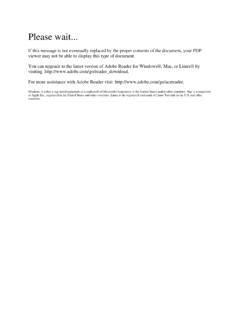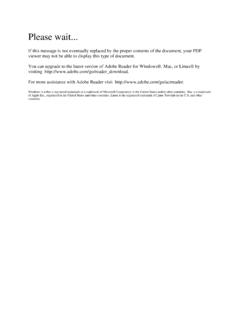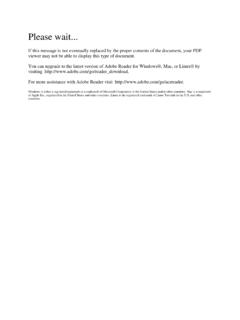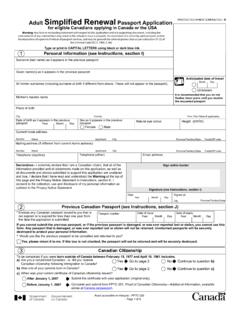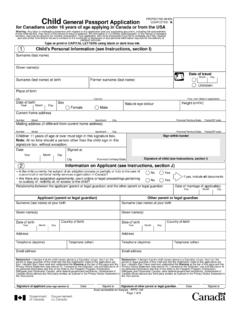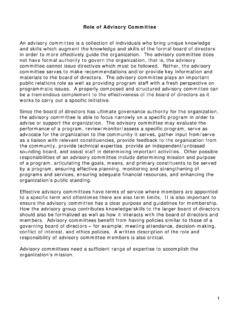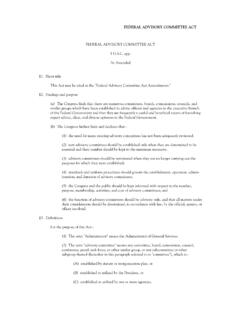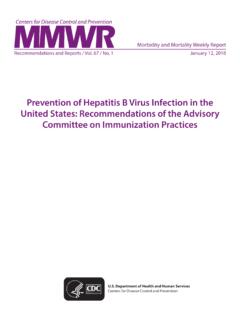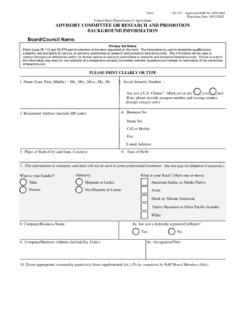Transcription of An Advisory Committee Statement (ACS) National Advisory ...
1 1 | INTERIM GUIDANCE ON BOOSTER COVID-19 VACCINE DOSES IN CANADA An Advisory Committee Statement (ACS) National Advisory Committee on Immunization (NACI) Interim guidance on booster COVID-19 vaccine doses in Canada Published: October 29, 2021 2 | INTERIM GUIDANCE ON BOOSTER COVID-19 VACCINE DOSES IN CANADA Preamble The National Advisory Committee on Immunization (NACI) is an External Advisory Body that provides the Public Health Agency of Canada (PHAC) with independent, ongoing and timely medical, scientific, and public health advice in response to questions from PHAC relating to immunization.
2 In addition to burden of disease and vaccine characteristics, PHAC has expanded the mandate of NACI to include the systematic consideration of programmatic factors in developing evidence based recommendations to facilitate timely decision-making for publicly funded vaccine programs at provincial and territorial levels. The additional factors to be systematically considered by NACI include: economics, ethics, equity, feasibility, and acceptability. Not all NACI Statements will require in-depth analyses of all programmatic factors.
3 While systematic consideration of programmatic factors will be conducted using evidence-informed tools to identify distinct issues that could impact decision-making for recommendation development, only distinct issues identified as being specific to the vaccine or vaccine-preventable disease will be included. This Statement contains NACI s independent advice and recommendations, which are based upon the best current available scientific knowledge. This document is being disseminated for information purposes.
4 People administering the vaccine should also be aware of the contents of the relevant product monograph. Recommendations for use and other information set out herein may differ from that set out in the product monographs of the Canadian manufacturers of the vaccines. Manufacturer(s) have sought approval of the vaccines and provided evidence as to its safety and efficacy only when it is used in accordance with the product monographs. NACI members and liaison members conduct themselves within the context of PHAC s Policy on Conflict of Interest, including yearly declaration of potential conflict of interest.
5 3 | INTERIM GUIDANCE ON BOOSTER COVID-19 VACCINE DOSES IN CANADA Background NACI s recommendations on booster doses will be based on the decision-making framework outlined in this document, triggered by evidence of the need for ( , evidence of decreased vaccine effectiveness against severe illness and/or infection depending on the population) and benefit of ( , safety and effectiveness) a booster dose in the Canadian context. The public health goal of Canada's pandemic response is to minimize serious illness and death while minimizing societal disruption as a result of the COVID-19 pandemic.
6 COVID-19 vaccines have played a vital role in the response and have been shown to be very effective against symptomatic laboratory confirmed SARS-CoV-2 infection, severe disease, hospitalization, and death from COVID-19. Unfortunately, the COVID-19 pandemic is ongoing and continues to cause significant morbidity and mortality, as well as social and economic disruption in Canada and worldwide (including impacts on health system capacity). COVID-19 vaccination with a complete primary series is critical.
7 Fully vaccinated individuals have much lower rates of SARS-CoV-2 hospitalizations, ICU admission and mortality compared to those who are unvaccinated. In addition, those who have been vaccinated are less likely to get infected, and therefore less likely to transmit SARS-CoV-2 infection to others. NACI continues to strongly recommend that all individuals in the authorized age groups should be immunized with a primary series of an authorized COVID-19 vaccine, and preferably with mRNA COVID-19 vaccines (Moderna Spikevax and Pfizer-BioNTech Comirnaty) (1).
8 To date, COVID-19 vaccines have been shown to maintain high vaccine effectiveness (VE) against serious illness, hospitalization, and death from COVID-19 in most populations. However, evidence is emerging that VE against asymptomatic infection and mild COVID-19 disease may decrease with time, and that currently authorized COVID-19 vaccines may be less effective against the highly transmissible Delta variant ( ), which could contribute to increased transmission of infection. Therefore, an additional or booster dose may be needed to obtain more durable protection in some populations.
9 Evidence from clinical trials suggests that booster doses of mRNA vaccines given six months after the primary series elicited a robust immune response against the wild type strain and variants of Concern (VoC), with titres often higher after the booster dose than after the primary series. Real-world data from Israel suggest that a booster dose provides good short-term effectiveness against SARS-CoV-2 infection and has a safety profile comparable to that observed after the second dose of the vaccine.
10 The intent of a booster dose is to restore protection that may have decreased over time to a level that is no longer deemed sufficient in individuals who initially responded adequately to a complete primary vaccine series. This is distinguished from the intent of an additional dose which might be added to the standard primary vaccine series with the aim of enhancing the immune response and establishing an adequate level of protection. For example, evidence suggests that compared to the general population, individuals who are moderately to severely immunocompromised have lower immune responses to COVID-19 vaccines.
